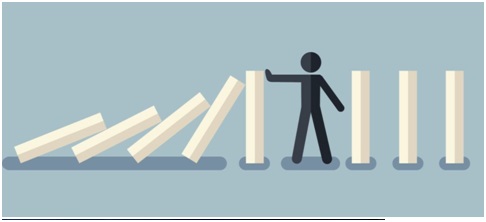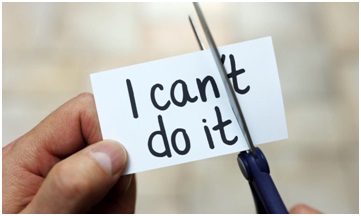 A Coaching Power Tool Created by K.Mariam Jafri
A Coaching Power Tool Created by K.Mariam Jafri
(Parenting Coach, INDIA)

One day you will tell your story of how you overcame what you went through and it will be someone else’s survival guide. – Brene Brown
Just as we acquire knowledge, build relationships, develop skills and gain experience over time, we also lose things. It could be our job, hard-earned savings, our enthusiasm about a passion we had, or a fitness regime we diligently followed earlier.
While the impact of some of these losses could be seemingly insignificant, others might affect us to a great extent. Losing out on confidence, our health to disease and sickness, and/ or valuable personal connections can often impede our growth and leave us feeling dysfunctional at times. In situations like these, we can either try and reclaim what we have lost or resigned to our fate and accept things the way they are.
As per the Oxford Dictionary, ‘to resign’ means “to accept that something undesirable cannot be avoided”. ‘Reclaim’ on the other hand is defined as “to retrieve or recover something previously lost”. Reclaiming is an empowering perspective, resigning is the opposite.
The attitude to reclaiming needs positivity and determination, to leave the comfort zone and seize every opportunity to replace that sense of loss. Once we realize that we have this power, there may be no looking back. The attitude towards resigning on the other hand suffers from its underlying weakness, of turning itself into a habit. While we may grieve the loss of something or someone important, there is nothing that we choose to do about it. It can leave us with a sense of helplessness, hopelessness, and victimhood; with no sense of control or power over what we have and what we may lose in the future.
A lot of our life problems begin with loss; financial loss, divorce, unemployment, and poor health ( with or without choice). We can choose to ruminate over these by blaming others for our misery or we can decide to take control of our lives and prepare to reclaim that loss.

Imagine the following situation:
Ana lost her job as a result of the global pandemic of 2020. This came at a time when she was saving every penny for her dream venture. Ana loved nature and had dreamt of building her eco-lodge in the mountains for the last five years. This job loss shattered her dream as she would now need her savings to last the next few months and her dream suddenly looked more distant. She showed very little interest in finding new jobs as she saw it as another impediment to her dream of having her own business.
If Ana lets the time slip away, she will lose most of her savings. With an attitude to resign to fate, her dream would move further away from her making her bitter and frustrated. She will lose the enthusiasm towards work that would further sabotage her career, growth, and financial stability. Needless to say, her self esteem and confidence would also be affected.
On the other hand, choosing to reclaim power over her life and her dreams, Ana can start looking for work opportunities right away. With a belief in herself and her abilities, she can think creatively to make the best out of this unforeseen situation.
Ana chose to do the latter. She decided to not waste any more time and found a job that paid her only half of what she earned earlier. With this experience, she realized that life was uncertain. This made her even more resolute to start working towards her eco-lodge. Since she was working remotely, she moved to the hills to be closer to her dream project. She paid the advance for a piece of land where she would eventually build her eco-lodge. By reclaiming control of her life, dreams, and finances, Ana was able to turn the tide in her favor.
Many clients who come to coaching could be dealing with a similar sense of loss. A coach’s responsibility is to empower the client to be able to see the difference between the two attitudes and their impacts in the long run. A coach would be able to identify significant patterns and underlying beliefs that may be responsible for the client’s thinking and behaviors.
Building Resilience
The greatest glory in living lies not in never falling, but in rising every time we fall. Nelson Mandela
 Katie Hurley, a health writer, describes resilience as “the ability to withstand adversity and bounce back from difficult life events. Being resilient does not mean that people don’t experience stress, emotional upheaval, and suffering. Some people equate resilience with mental toughness but demonstrating resilience includes working through emotional pain and suffering”. She stresses that resilience provides us the necessary strength to process and overcome hardships. While it comes naturally to many, these behaviors can also be learned with time and practice.
Katie Hurley, a health writer, describes resilience as “the ability to withstand adversity and bounce back from difficult life events. Being resilient does not mean that people don’t experience stress, emotional upheaval, and suffering. Some people equate resilience with mental toughness but demonstrating resilience includes working through emotional pain and suffering”. She stresses that resilience provides us the necessary strength to process and overcome hardships. While it comes naturally to many, these behaviors can also be learned with time and practice.
Kendra Cherry, an educator, and author in the field of Psychology suggests the following ways to build resilience:
- Find a sense of purpose: We may feel weak in the face of adversity and tragedy and find it easier to let go of our goals. Being resolute and purposeful and pushing the boundaries harder would set us on the path to success, happiness, and growth.
- Believe in your abilities: Developing confidence in your own abilities, including your ability to respond to and deal with a crisis, is a great way to build resilience for the future. Listen for negative comments in your head. When you hear them, immediately practice replacing them with positive ones, such as, “I can do this” or “I’m good at my job”. Research has demonstrated that our self-esteem plays an important role in coping with stress and recovering from difficult events. Remind yourself of your strengths and accomplishments.
- Develop a strong social network: Having caring, supportive people around you acts as a protective factor during a crisis. While simply talking about a situation with a friend or loved one won’t make your troubles go away, it allows you to share your feelings, get support, receive positive feedback, and come up with possible solutions to your problems.
- Embrace change: Flexibility is an essential part of resilience. By learning how to be more adaptable, you’ll be better equipped to respond when faced with a life crisis. Resilient people often utilize these events as an opportunity to branch out in new directions. While some people may be crushed by abrupt changes, highly resilient individuals can adapt and thrive.
- Be optimistic: What you are dealing with may be difficult, but it’s important to remain hopeful and positive about a brighter future. Positive thinking does not mean ignoring the problem to focus on positive outcomes. It means understanding that setbacks are temporary and that you have the skills and tools to combat the challenges you face.
- Nurture yourself: When you’re stressed, it can be all too easy to neglect your own needs. Emotional eating, ignoring exercise, and not getting enough sleep are all common reactions to a crisis. Instead, focus on building your self-nurturance skills, even when you’re troubled.
- Develop problem-solving skills: Research suggests that people who can come up with solutions to a problem are better equipped to cope with problems than those who cannot. Experiment with different strategies and focus on developing a logical way to work through common problems. By practicing your problem-solving skills regularly, you will be better prepared to cope when a serious challenge emerges.
- Establish goals: Crises are daunting. When you find yourself becoming overwhelmed by a situation, take a step back to simply assess what is before you. Brainstorm possible solutions, and then break them down into manageable steps.
- Take action: Simply waiting for a problem to go away on its own only prolongs the crisis. Instead, start working on resolving the issue immediately. While there may not be any fast or simple solution, you can take steps toward making your situation better and less stressful. Rather than just waiting for things to happen, being proactive allows you to be in charge of the situation.
- Keep working on your skills: Resilience may take time to build, so don’t get discouraged if you still struggle to cope with problematic events. At the same time, continue to work on your existing skills.
Self Application
I can be changed by what happens to me. But I refuse to be reduced by it. –Maya Angelou

Imagine the following scenario:
You are walking with a child who is collecting pine cones in a basket for Christmas decoration at home. The child is very excited and looking forward to fulfilling this responsibility well. He takes time and patiently selects the finest, nonchipped pine cones. As he is about to reach home, he realizes that two pine cones fell on the way. The child gets upset and starts crying out of frustration. What advice will you give to the child? That it was his destiny to lose them and he cannot do anything about it or that it’s worth going back and trying to find them. He will recognize them with ease since he collected them with so much love and they must not have fallen far away from home.
Instead of finding someone to blame for our problems or discounting it to fate, we too can go a few steps back and reclaim the lost pine cones.
“The ability to bounce back -even in the midst of outrageous circumstances, loss, or disappointment – is built into every human being. Resilience is there for you, whenever you chose to use it”, writes Chris Westfall in his article on resilience for Forbes.com. There is always hope and there is always a solution. Our frustrations and disappointments can sometimes act as barriers that prevent us from finding the right solutions. It is important to acknowledge what we experience at the right time to find our way forward.
The global pandemic of 2020 has taught us some crucial life lessons. Nobody was prepared for a global lockdown, but as it turned out we were locked in our homes, many of us lost our jobs, canceled our holidays, got sick from, or lost our loved ones to the virus. While we grieved the unfortunate reality, we were quick to adapt to new ways of learning, working, celebrating, and being there for our near and dear ones. We picked up new hobbies, raised money to support small businesses and individuals in need, and connected with our families like never before. We lost some things but we reclaimed our power to shape our destiny nevertheless. Today we have emerged far more resilient, adaptable and resourceful. Life will continue to surprise us, what we can control is our response to these surprises. We can resign to such adversities or seize them as opportunities for growth and reclaim power over our lives.
Our greatest weakness lies in giving up. The most certain way to succeed is always to try just one more time. – Thomas Edison
Self-Reflection
References:
